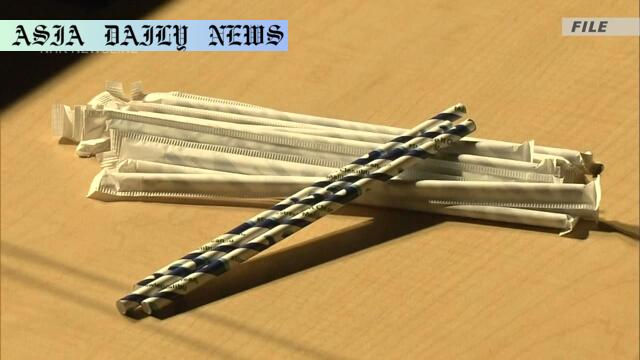Paper Straws: US President Donald Trump signs an executive order banning paper straws in federal agencies, reverting to plastic.
Trump bans paper straws in federal agencies, marking a policy shift.
He criticized paper straws for their fragility and inconvenience.
The Biden administration had earlier promoted reducing single-use plastics.
The move contradicts growing environmental measures in the US.

Trump’s Executive Order: Paper Straws Out, Plastic Straws In
On Monday, US President Donald Trump officially signed an executive order banning the use of paper straws in federal agency buildings. This decision comes after Trump expressed dissatisfaction with paper straws, deeming them ineffective, fragile, and inconvenient. The order directs agencies to cease purchasing paper straws and ensure only plastic straws are made available in their facilities. This directive marks a clear departure from the Biden administration’s environmentally-focused policies, which advocated for reducing single-use plastics, including the adoption of paper alternatives.
A Backlash Against Environmental Progress?
The global push to replace plastic straws with paper ones has gained significant traction over the past few years. Many local governments, businesses, and restaurants have embraced this shift to curb ocean pollution and reduce plastic waste. Trump’s decision to revert to plastic straws has sparked mixed reactions across the US, with environmentalists criticizing the move as regressive. By targeting paper straws specifically, Trump draws the debate into the spotlight, contrasting efforts for sustainability with his administration’s priorities.
Trump’s Critique of Paper Straws
The President made his views on paper straws clear during a recent social media post, calling them a “ridiculous” invention that “don’t work.” During the signing of the executive order, Trump doubled down on his opinion, highlighting that paper straws cannot endure significant use and break easily. “It’s a ridiculous situation,” Trump remarked, urging a return to practical and seemingly durable plastic options.
Contrasting Approaches: Trump vs. Biden
Trump’s stance on paper straws directly counters the Biden administration’s focus on environmental sustainability. Under Biden, there was a concerted effort to phase out single-use plastics across federal operations, which included promoting paper straws. Environmental advocates point to the alarming effects of plastic on marine life and climate change, arguing that limiting its usage is crucial. Trump’s decision challenges these narratives and reignites a culture war over environmental stewardship.
The Debate Over Convenience vs. Sustainability
This policy shift raises broader questions about balancing convenience with sustainability. While plastic straws are undeniably more durable and easier to use, their contribution to environmental harm is significant. On the other hand, paper straws, an alternative pushed for their eco-friendly attributes, often compromise user experience due to their fragility. Trump’s decision to favor convenience over ecological impact has stirred debate, with some applauding the return to functionality and others condemning the environmental consequences.
The Environmental Stake
Environmental groups have long advocated for the reduction of disposable plastics, highlighting their devastating effect on marine ecosystems. Plastic straws, accounting for a significant share of plastic waste, are notoriously difficult to recycle. Replacing them with biodegradable alternatives like paper straws was seen as a step towards addressing the global plastic pollution crisis. Trump’s move undeniably sets back this fight, bringing into question the government’s commitment to combating environmental degradation.
Future Implications
This executive order underscores how policy decisions can reflect broader ideological differences. Trump’s defiance of sustainability measures suggests a prioritization of immediate convenience over long-term environmental goals. As environmental challenges grow increasingly urgent, this move could inspire further debate on the role of public officials in addressing—or ignoring—sustainability concerns. Will other sectors follow suit with similar reversals, or will this spark a wave of resistance from environmental advocates?
Commentary
A Polarizing Move in the Fight Against Plastic Pollution
President Trump’s executive order banning paper straws in federal agencies is a stark reminder of the ideological battles shaping public policy. At its core, this decision pits convenience and practicality against sustainability, and in doing so, it draws a sharp divide between the priorities of Trump and his predecessor, Joe Biden. By targeting paper straws specifically, Trump has reignited a culture war over environmental responsibility and individual comfort.
The Debate Over Paper vs. Plastic
Anyone who has used a paper straw understands the frustration—their tendency to break down mid-use can be incredibly inconvenient. Trump’s criticism, in this respect, echoes the frustration of many. However, the motivation to promote paper straws stems from their eco-friendly nature. This material often biodegrades faster than plastic, which infamously lingers in our ecosystems for centuries. Trump’s decision may please consumers seeking practical solutions but risks undermining environmental progress.
Environmental Policy at a Crossroads
This move also highlights a broader conversation about the government’s role in addressing ecological challenges. Local governments and the private sector have taken significant strides toward reducing plastic waste, but federal action—or inaction—carries weight. By undoing a small but symbolically significant eco-conscious measure, Trump’s executive order raises questions about the federal government’s commitment—or lack thereof—to combating climate change and pollution.
What Comes Next?
The reaction to this policy shift will likely be mixed, with staunch supporters hailing it as a return to practicality and critics decrying it as a step backward. This decision underscores the tension between individual convenience and collective responsibility, a debate that will undoubtedly continue as environmental challenges escalate. The question remains: how far is the public willing to go to address the planet’s mounting ecological woes?


